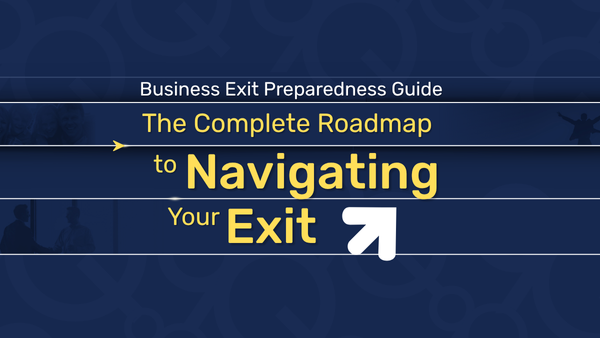Let me surprise you for a second. The biggest factor determining whether your business sale succeeds or fails isn’t your EBITDA, your growth rate, or even your asking price. It’s your business mindset and emotional readiness to let go.
After three decades of founding companies and helping business owners navigate exits, I’ve witnessed deals collapse not because of financial issues, legal complications, or market conditions, but because sellers weren’t mentally prepared for what selling their business actually means. The numbers might be perfect, but if your business mindset, head, and heart aren’t aligned, you’re setting yourself up for a painful, expensive failure.
Let me share why the business mindset and mental game matter so much—and how to prepare yourself emotionally for one of the biggest transitions of your entrepreneurial life.
The Identity Crisis No One Talks About

For most entrepreneurs, their business isn’t just an asset—it’s their identity. According to a 2023 study by the Exit Planning Institute, 67% of business owners report experiencing what researchers call “seller’s remorse” during the sales process, with 23% ultimately backing out of deals due to emotional attachment rather than financial concerns.
Think about it. You’ve probably introduced yourself as “the founder of XYZ Company” for years, maybe decades. Your business has been your primary source of purpose, validation, and often social connection. The Harvard Business Review’s 2023 research on entrepreneurial identity found that 78% of business founders struggle with the question “Who am I without my business?” during exit planning.
This identity fusion creates what psychologists call “loss aversion bias”—the tendency to overvalue what you already own. Behavioral economics research shows that business owners typically value their companies 20-40% higher than market rates, not because of financial miscalculation, but because of emotional attachment.
The Real Cost: This emotional overvaluation leads to unrealistic pricing expectations, inflexible negotiation positions, and ultimately, failed sales. The International Business Brokers Association reports that emotional attachment is the primary factor in 34% of deal failures.
The Entrepreneur's Dilemma: Control vs. Cash

Another psychological hurdle is what I call the “control paradox.” You’ve spent years making every critical decision, solving every major problem, and steering every strategic direction. However, the thought of handing that control to someone else—regardless of how capable they are—triggers deep anxiety for most founders. This reaction highlights how essential a resilient business mindset is during the exit process.
Research from the Family Business Institute shows that 89% of first-time sellers experience “control anxiety” during negotiations. This often manifests as:
Second-guessing buyer qualifications even when they’re clearly capable
Adding unnecessary conditions to protect against imaginary future problems
Micromanaging due diligence processes instead of trusting the buyer’s expertise
Creating last-minute deal changes to maintain some level of ongoing control
Moreover, Stanford Business School’s longitudinal study of entrepreneurial exits found that sellers who struggle with control issues take 47% longer to close deals and achieve 15% lower final sale prices due to negotiation friction and buyer fatigue. Therefore, developing a strong business mindset can make the difference between a smooth, high-value exit and a drawn-out, stressful one.
The Success Trap: When Winning Becomes a Prison

Paradoxically, the more successful your business becomes, the harder it can be to sell emotionally. Success creates what psychologists call “identity entrenchment”—your sense of self becomes so intertwined with your business success that contemplating life without it feels like contemplating personal failure.
The Kauffman Foundation‘s 2023 Entrepreneur Exit Survey found that highly successful business owners (those with companies valued over $5 million) are 43% more likely to experience pre-sale anxiety and 29% more likely to delay their exit timeline due to emotional unpreparedness, despite having the strongest financial incentives to sell.
This creates a dangerous cycle: the longer you wait, the more entrenched your identity becomes, making future exits even more psychologically challenging.
The Hidden Emotional Costs of an Unprepared Exit

When entrepreneurs aren’t emotionally ready to sell, the consequences extend far beyond deal failure. Research from the University of Pennsylvania’s Wharton School tracking 500 business exits over five years found concerning patterns among emotionally unprepared sellers:
Decision Paralysis: 56% of unprepared sellers changed their minds multiple times during the sales process, creating confusion, frustration, and lost opportunities.
Relationship Damage: 41% reported damaged relationships with family members due to the stress and uncertainty of prolonged exit processes.
Financial Losses: Emotionally driven decisions led to an average of 18% lower sale prices compared to mentally prepared sellers.
Post-Sale Depression: 63% of unprepared sellers experienced what researchers termed “entrepreneurial depression” in the 12 months following their exit, compared to 23% of those who had prepared mentally.
Preparing Your Mind for Success: The Emotional Exit Strategy

The good news? Emotional readiness is completely within your control. Here’s how to prepare your mind for a successful, fulfilling exit:
1. Start the Conversation Early
Begin discussing your eventual exit at least 2-3 years before you want to sell. The Exit Planning Institute found that entrepreneurs who spend at least 18 months mentally preparing for their exit are 67% more likely to complete successful sales and report 73% higher satisfaction with their outcomes.
Talk with trusted advisors, family members, and even other entrepreneurs who’ve successfully exited. The more you normalize the idea of selling, the less emotionally charged it becomes.
2. Redefine Your Identity Beyond Your Business
Start identifying yourself as more than just your company’s founder. What are your values, interests, and goals beyond business ownership? Research from the Center for Creative Leadership shows that entrepreneurs who develop strong non-business identities are 54% more likely to execute successful exits.
Consider: What would you do with unlimited time and resources? What problems would you solve? What experiences would you pursue? Begin cultivating these interests before you sell, not after.
3. Create Your Post-Exit Vision
Uncertainty breeds anxiety. The clearer your vision for life after your business, the easier it becomes to let go. Stanford’s research shows that sellers with specific post-exit plans are 61% more likely to complete their sales and report significantly higher satisfaction with their outcomes.
Write down exactly what your ideal post-sale life looks like. Travel plans? New business ventures? Family time? Philanthropic goals? The more detailed and exciting this vision becomes, the more motivating your exit becomes.
4. Practice Gradual Detachment
Start delegating more decisions and stepping back from day-to-day operations 12-18 months before your planned exit. This serves two purposes: it proves your business can run without you (increasing its value), and it helps you psychologically adjust to reduced control.
The Family Business Institute found that entrepreneurs who practiced “graduated disengagement” experienced 42% less anxiety during actual sale negotiations.
5. Address the Fear Directly
Most exit anxiety stems from fear of the unknown. What if you make the wrong decision? What if you regret selling? What if the buyer ruins what you’ve built?
Acknowledge these fears explicitly. Write them down. Discuss them with advisors. Often, simply naming your fears reduces their psychological power. Research from UCLA shows that labeling emotions reduces activity in the brain’s fear center by an average of 50%.
The Mindset That Closes Deals

Emotionally prepared sellers share common mental frameworks:
Abundance Thinking: They view the sale as opening new opportunities rather than closing a chapter. This positive framing makes negotiations more collaborative and less adversarial.
Legacy Focus: They’re more concerned with ensuring their business thrives under new ownership than maximizing the last dollar of purchase price. This attracts quality buyers who respect their intentions.
Future Orientation: They’re genuinely excited about their post-exit plans, making it easier to let go of their current role.
Trust in Systems: They’ve built businesses that can operate without them, giving them confidence in their company’s continued success.
Your Mental Preparation Action Plan

Start Now: Regardless of when you plan to sell, begin the emotional preparation process today. Mental readiness isn’t something you can rush.
Seek Support: Consider working with advisors who understand both the business and psychological aspects of exits. Many successful entrepreneurs benefit from executive coaches specializing in transitions.
Document Your Journey: Keep a journal of your thoughts, fears, and excitement about eventually selling. This process helps you work through emotions before they impact business decisions.
Connect with Other Sellers: Join entrepreneur groups or seek mentors who’ve successfully exited. Their perspectives can normalize your experience and provide valuable insights.
The entrepreneurs who achieve the most successful, satisfying exits aren’t necessarily those with the best financial metrics. They’re the ones who’ve done the emotional work to prepare for one of life’s biggest transitions.
Your business represents years of passion, sacrifice, and dedication. You deserve an exit that honors that investment while setting you up for an exciting next chapter. The numbers will get you to the negotiating table, but your mindset will determine whether you successfully cross the finish line.
Start preparing your mind today. Your future self will thank you.







